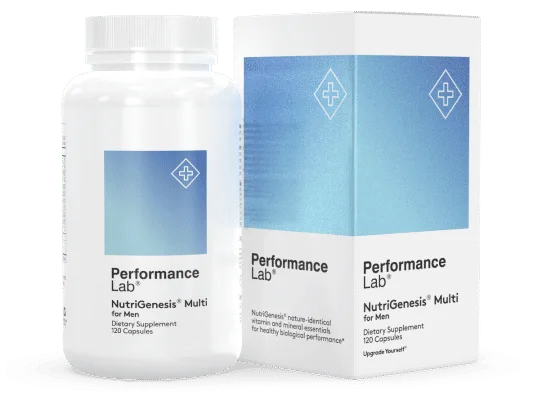Do multivitamins have all the vitamins needed for optimal health?
Not always.
While multivitamins aim to fill nutritional gaps, not all provide every vitamin your body needs.
The good news is that products like Performance Lab NutriGenesis Multi stand out, covering 17+ daily essential vitamins and minerals tailored specifically for men and women.
Want to know more about multivitamins, their benefits, limitations, and how to make the right choice? Keep reading.
Key Takeaways
- Multivitamins provide necessary nutrients for optimal health and support various bodily functions.
- A balanced diet with nutrient-rich foods is crucial and should not be replaced by multivitamins.
- Choosing the right multivitamin involves considering age, gender, specific dietary needs, and reputable brands with quality testing.
- Consulting with a healthcare professional is important for accurately assessing vitamin deficiencies, personalized recommendations, and avoiding the risk of overdosing on certain vitamins.
Discover the power of Performance Lab NutriGenesis Multi – easy-to-swallow pills to get your daily essentials with ease! Get yours today and take your nutrition game to the next level.
Understanding the Basics of Multivitamins
Multivitamins don’t always have all the vitamins, simply put.
When examining the research, it becomes evident that these supplements are designed to provide a range of essential vitamins and minerals. However, they may not contain all the nutrients the body requires [1].
It’s important to understand that each vitamin and mineral has specific dosage requirements for optimal health. While multivitamins aim to address nutrient deficiencies, they may not provide adequate amounts of certain vitamins.
For example, some multivitamins may lack sufficient amounts of vitamin D or iron, crucial for bone health and oxygen transport.
Therefore, it’s essential to carefully read the labels and consult with a healthcare professional to ensure you are meeting your individual nutrient needs.
Examining the Ingredients in Multivitamins
Essential Vitamins and Minerals
Let’s cut to the chase. You need to check your multivitamins like you’d inspect a second-hand car.
Those tiny powerhouses should be jam-packed with all the essential vitamins and minerals – they’re the real MVPs of your health game!
Imagine them as the superheroes of your body, each with their own unique superpower. Vitamin A, the night owl, keeps your eyes sharp when the sun goes down.
Vitamin C, the body’s personal builder, whips up a storm of collagen and boosts your immune system, while Vitamin D, the sun-kissed surfer, keeps your mood on the sunny side.
Then there’s Vitamin E, the bodyguard, shielding you from harm’s way.
Not to forget the B vitamins – think of them as a bustling bee colony, buzzing around and keeping your metabolism in check.
But remember, not all heroes wear capes – or come in the same doses.
Just like Goldilocks testing out porridge, you’ve gotta find the amount that’s just right for you – which your doctor should be more than happy to do.
Additional Nutrients and Supplements
So, you’re taking your multivitamin daily, good on you! But remember, it’s just the tip of the iceberg. It’s not the be-all and end-all of nutrition.
Picture your body as a high-performance car. The multivitamin is like the basic gas you need to keep it running, but you also need some fancy high-octane fuel for that extra kick. That’s where stuff like omega-3 fatty acids, probiotics, and antioxidants come in.
Omega-3s are your body’s supercharged fuel, keeping your heart thumping like a well-oiled machine. Probiotics are like tiny mechanics, keeping your gut and immune system in tip-top shape.
And antioxidants? They’re your car’s protective wax, shielding your cells from pesky free radicals who want to dent your shiny surface.
In a nutshell, don’t just rely on your multivitamin. It’s just one piece of the puzzle. Remember to invite those other nutrients to the party. They’re all part of the band playing the symphony of your well-being!
The Effectiveness of Multivitamins
Taking multivitamins can be a great way to ensure your body gets the range of vitamins and minerals it needs. Various scientific studies have delved into their effectiveness on our health, but the results are somewhat mixed.
Some studies suggest that multivitamins can be beneficial for specific groups like older adults or pregnant women. However, others argue that there’s no significant benefit to taking them.
Regardless of the side of the fence you sit on, it’s important to remember that while multivitamins can supplement a diet, they are not a substitute for a balanced, nutritious diet and a healthy lifestyle.
Keep in mind, too, that multivitamins can sometimes lead to side effects. These may include digestive issues such as nausea or an upset stomach.
In some cases, taking too much of certain vitamins can even be harmful, such as Vitamin A.
As always, if you’re thinking about starting on multivitamins, it’s a good idea to first discuss it with a healthcare professional.
Potential Benefits of Multivitamin Use
If you’re looking to fill nutritional gaps and support your overall health, multivitamin use may be beneficial.
Multivitamins can help provide essential nutrients that may be lacking in your diet, ensuring that you’re getting all the vitamins and minerals your body needs.
By taking a multivitamin daily, you can help promote optimal health and well-being.
Filling Nutritional Gaps
Multivitamins can help fill nutritional gaps by providing a wide range of essential vitamins and minerals. Nutritional deficiencies can have significant health implications, affecting various aspects of your well-being.
However, taking a daily multivitamin can be an effective way to ensure that your body is receiving all the necessary nutrients it needs to function optimally.
These supplements are formulated to contain recommended daily amounts of vitamins and minerals that may be lacking in your diet.
For example, if you don’t consume enough fruits and vegetables, a multivitamin can provide the necessary vitamins A, C, and E, which are crucial for immune function and overall health.
Multivitamins can also help fill gaps in nutrients like iron, calcium, and vitamin D, supporting bone health and preventing deficiencies that can lead to various health problems.
Supporting Overall Health
Multivitamins pack a wide array of essential vitamins and minerals, bridging nutritional gaps and bolstering your overall health. They play a vital role in fortifying your immunity and fostering healthy aging.
Key immune-enhancers like vitamins C and D, along with zinc, are often found in multivitamins. These elements help strengthen your body’s defenses and combat infections.
Further, antioxidants like vitamin E and selenium, also present in multivitamins, shield your cells against damage from harmful free radicals.
Additionally, multivitamins contribute to healthy aging. They provide nutrients like vitamin A, vitamin K, and calcium, all crucial for maintaining robust skin, bones, and muscles. They help sustain bone density and deter age-related bone deterioration.
In essence, multivitamins offer an easy way to ensure you’re receiving all the necessary nutrients for optimal health, enveloping immunity support and healthy aging.
Limitations and Drawbacks of Multivitamins
Multivitamins sure are handy, but they’re not magic beans. They pack quite the punch with a variety of vitamins and minerals, but they don’t cover everything your body needs.
Think about it: calcium for strong bones, iron to keep fatigue at bay, vitamin D for a robust immune system – these are crucial, but often not fully covered in your daily multivitamin.
And what about your unique health needs? A general multivitamin might not cut it. Plus, going overboard on some vitamins and minerals isn’t great; too much vitamin A or iron can cause more harm than good.
So, before you start popping those multivitamins like candy, have a chat with your healthcare provider. They can guide you to meet your nutritional needs safely and effectively.
But remember, multivitamins are the sidekick, not the superhero. A balanced diet and regular health check-ups should be leading the charge towards your optimal health.
The Role of a Balanced Diet
Staying healthy and vibrant is all about balance, especially when it comes to our diet.
Imagine your body as a complex machine that thrives on a cocktail of essential nutrients, all working in harmony to keep you at your best.
Fill your plate with a colorful mix of fruits and vegetables, whole grains, lean proteins, and good fats.
Each of these nourishing foods deliver a powerhouse of vitamins, minerals, antioxidants, and fiber that keep your body ticking and your taste buds happy.
The key is variety. A diverse menu not only keeps meal times exciting but also ensures your body gets the full spectrum of nutrients it needs.
This doesn’t just tick off your daily vitamin and mineral quota, but also packs in extra health perks by reducing the risk of chronic disease.
And while we’re on the topic of vitamins, remember that multivitamins are just the understudies—they can fill in the gaps but should never be the star of the show. Keep them as your safety net, not your main plan.
So, let’s make eating well a priority. Because feeding your body with the right nutrients is the best recipe for a well-tuned, high-performing you.
Considerations for Choosing the Right Multivitamin
When choosing the right multivitamin for yourself, it’s important to consider factors such as your age, gender, and specific dietary needs. Different brands offer various formulations tailored to meet specific requirements.
It’s crucial to select a reputable brand that undergoes rigorous quality testing and adheres to manufacturing standards. Look for a multivitamin that provides a comprehensive range of essential vitamins and minerals.
Dosage recommendations may vary depending on age and gender, so it’s essential to follow the instructions provided by the manufacturer or consult with a healthcare professional. For example, pregnant women may require higher levels of certain nutrients like folic acid.
Additionally, individuals with specific dietary restrictions, such as vegans or vegetarians, should ensure the multivitamin they choose contains adequate amounts of nutrients typically found in animal products, such as vitamin B12.
Taking these considerations into account will help you find the right multivitamin to supplement your balanced diet.
Do Multivitamins Have All The Vitamins? – Final Thoughts
To wrap up, multivitamins are a powerhouse of many essential nutrients, but not all.
They’re a supportive player in our health journey, not the sole star.
A balanced diet and professional advice are key to filling in nutritional gaps.
Remember, multivitamins are part of the solution, not the whole answer to our wellbeing.






Leave a Reply